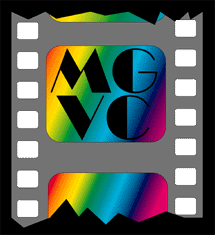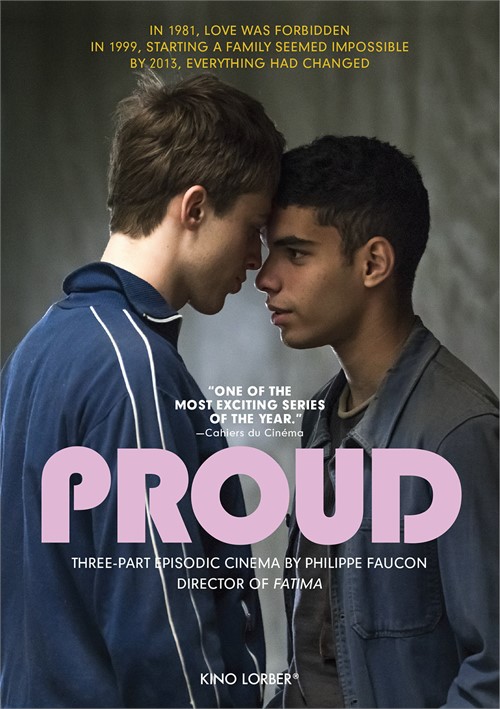(2018, 151 min)
Country: France
Director: Phillippe Faucoon
Studio: Kino Lorber
Language: French w/subtitles
SYNOPSIS: In 1981, love was forbidden. In 1999, starting a family seemed impossible. By 2013, everything had changed. From Philippe Faucon, the award-winning director of Fatima, this amazing new three-part cinematic event takes us through each of these years. Proud tells the stories of Charles, Victor and Diego, three generations of the same family who represent the seismic social changes that took place in just three decades. Cahiers du Cinema called Proud "one of the most exciting series of the year." Le Parisien called it "A series that defends the fundamental rights of gay people."
REVIEW:
"Proud" is director Philippe Faucon's powerful three-part drama that details the struggles of being gay in France in the 1980s - a time when the laws were stacked against the LGBTQ community, and many relationships had to be secret. Then the narrative jumps years ahead to show the progress of the movement and some of the acceptance that has come. While "Proud" is technically a TV miniseries, it but plays like a movie in three parts.
The first chapter follows Victor (Benjamin Voisin), who is about to graduate high school and has decided to work on construction sites with his father, Charles (Frédéric Pierrot). One day, when taking a break, Charles sees Victor hooking up with Sélim (Sami Outalbali), and the father cannot believe his eyes. He thought his son was in a relationship with a girl, Aurélie (Lou Roy-Lecollinet), and he cannot accept that his son is gay.
Charles struggles with this. Victor is his only son, and he and his wife, Martine (Emmanuelle Bercot), spoil him and hope the best for him. Charles is also a left-leaning political activist who prides himself on being progressive and voting for the socialist candidates. He is politically liberal but refuses to allow those principles to play out in his family members' actual lives.
Eventually Charles comes around a bit but he simply cannot accept Victor's new love interest: a much older Serge (Stanislas Nordey). That is the breaking point, and father and son eventually confront each other.
"Proud" follows the many different elements of the gay-rights movement over the last 30-plus years in France. The narrative jumps decade by decade in the second and third installments and a more complete look at what it means to grow up in the LGBTQ community is the focus. The film leaves viewers with a real and effective snapshot of how progress has been made in the fight for LGBTQ rights and how much still has to be done. The characters are real and authentic and we meet family members and friends living, struggling and fighting for their rights. This is one of the best treatments that places individual gay lives squarely in the context of politics and society of specific points in time and the film scored high with French critics. The relevance of the material and the authenticity of the emotion makes it an important film to see.
After Selim, Victor tries to repress his feelings for men but can't. One desperate night, as he ventures into a gay meeting place, he meets Serge who is a gay activist and 20 older than he is. Their relationship becomes serious, and gradually s Victor to fully acknowledge his homosexuality. Charles, who does not understand his son, s him to make a choice between Serge and his family. With that, Victor understands that to live his love story, he will have to fight against prejudices and against society in general. At Serge's urging, Victor comes out to his parents, but it goes very badly with his father. As soon as he's 18, he is a free agent and goes to live with Serge.
In the second episode, it's 12 years later. Victor (now played by Samuel Theis) is 36 and a successful architect (independently, working a lot at home) and still living with Serge who is now HIV-positive, unsure of his future. When Victor tries to explain to his father that what he wants is to be the same as everyone else. He does not want to hide and but to live the same life as others. Charles and Victor become somewhat reconciled and Charles tolerates his son's sexual orientation and the importance of Serge, though with difficulty.
Victor struggles with wanting to adopt a child but nobody really supports him including Serge who feels that he may not live long enough to be a good parent, though Victor points out to him doctors have said he may live decades. A social worker (Chiara Mastroianni) and Victor tries to convince that he is fit to be a single parent. He can't show that he's gay because, while it's no longer illegal, gay parents get rejected for adoptions. When Chiara interviews Charles, without telling her his son is gay, he obeys Victor's request that he lie for him but he n hints that Victor has a relationship he's not telling about, and his adoption request is rejected. Episode two covers the frustrations of trying to lead a full life as a gay person even in a relatively tolerant climate.
In Episode three, there are many complications . The main focus is Diego (Julien Lopez), the adopted son, a lycée student. He dominates the screen with his warm and vibrant presence, passion, and big smile. He is strong, but he has a lot to deal with. He is teased for having gay parents. He takes refuge from the sometimes cold Victor with his own daddy issues, with "Papi," Charles, gray-bearded and retired and mellow now and a warm support. It gets even more complicated in this episode when a new girlfriend, Noémie (Rebecca Marder) is hospitalized when she accidentally takes Ecstasy and her parents and bigot brother Paul (Hugo Sire) blame him - and his "fake" parents. Victor gets a serious beating from extremists when he's late joining a pro-gay marriage rally, which draws in former lover Pio (Jérémie Elkaïm). Serge is worn down by decades of surviving with HIV and the side effects from meds. He just wants to die. He does not live to officially marry Victor under the new French law, but there is no sadness, and the episode ends with smiles and the feeling that the world has become more on our side.
"Proud" is a complex and challenging watch. It addresses important issues and dares to go where few others do not and it is an essential inclusion to the ever-growing canon of important LGBT films.
-- Review by Amos Lassen, Reviews (http://wwww.Reviewsbyamoslassen.com)




